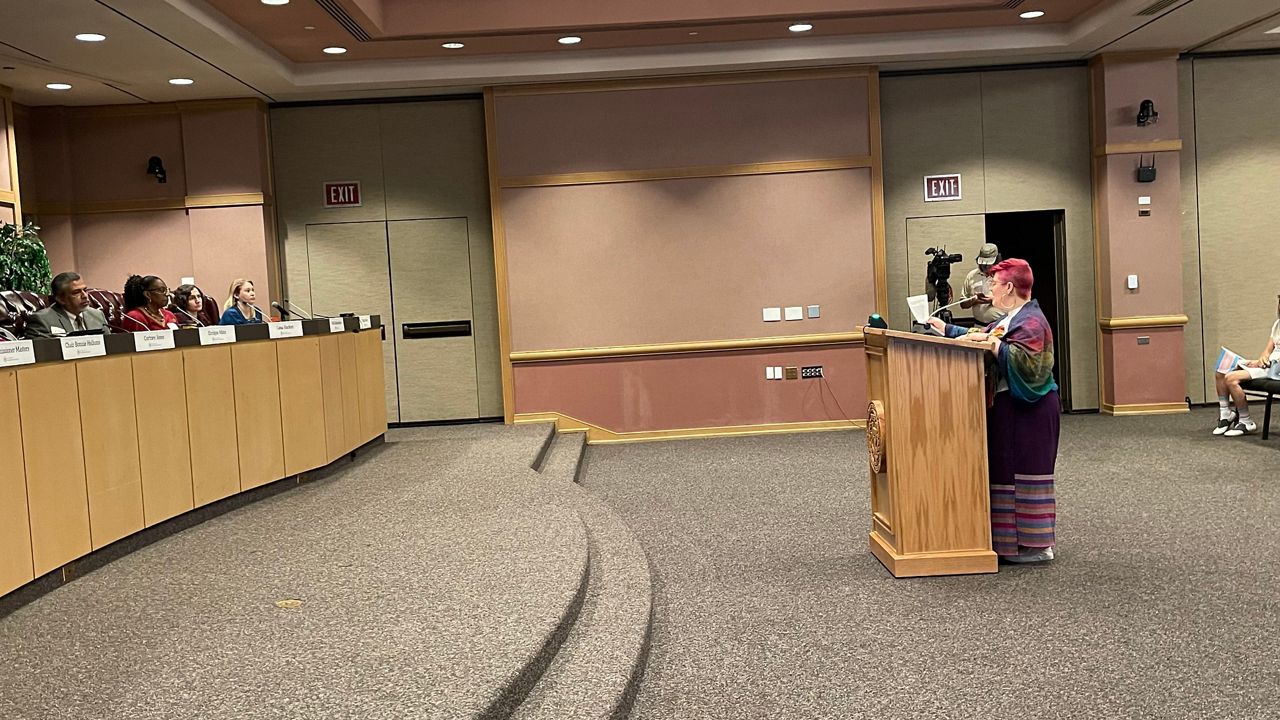AUSTIN, Texas — Friday began with families decrying the investigation of parents who provide gender-affirming care for their transgender children and ended with a Travis County judge issuing a temporary restraining order to stop those same investigations, at least for a certain subset of parents who identify with an association.
The state created the Texas Family and Protective Services Council when the Department of Family and Protective Services broke off from the Health and Human Services Commission in 2017. Friday morning, 62 speakers signed up to address the council.
Most had the same topic: transgender parents who fear a DFPS investigation for child abuse.
So far, no more than a dozen DFPS investigations have been publicized, most of them around the time of Gov. Greg Abbott’s initial directive. Abbott’s letter to Commissioner DFPS Commissioner Jaime Masters on Feb. 22 was one page, noting that sex change operations could be defined as child abuse and should be investigated.
The mere threat of an investigation, however, has parents appalled and upset. More than a handful of statements read to the Texas Family and Protective Services Council were read by proxy because people feared testifying would lead to investigations.
Some speakers on Friday morning were parents. At least one was a 13-year-old transgender child. A handful worked with or for DFPS, including a counselor. Others were the parents of adult transgender children who wanted to read the words of those parents who still feared retribution from a state agency.
One speaker, reading the words of a therapist who worked with foster children, said she had to refer out 13 children to other providers in order to avoid reporting them as transgender youth. The therapist said she no long had confidence DFPS was doing what was in the interest of children and their families.
“I was part of the solution, not part of the problem,” Susan Theiss read of the person’s testimony. “Commissioner [Jaime] Masters continued to remain silent during multiple attempts by professionals to express how important your voice was for trans youth. It disgusted me as time passed, and my friend was being investigated, with no end in sight. It’s infuriating.”
Morgan Davis, an investigator who resigned from DFPS after he was assigned a transgender investigation, said 150 of his colleagues had resigned from the agency in protest of the transgender policy. The agency, asked directly, couldn’t confirm that number, saying employees aren’t required to cite a reason for why they are quitting when they resign.
“We want our jobs back. We would love to do it right,” Davis told the council. “We want to take care of these children. I want to be the advocate that I wanted for me as a child. Let me do that. Beautiful children deserve to be beautiful adults, and that’s all we’re asking.”
The entire audience stood and clapped when Davis left the podium.
Jo Ivester, the mother of a transgender adult, read the words of a mother who is being investigated. The mother lamented how well her transgender daughter was doing with the right care.
“When she came out to me, I feared she would be subject to violence and hardship,” Ivester read. “But the American Association of Pediatrics recommended affirming gender identity as a medical necessity to keep our children safe and healthy, which is what every mother wants.”
Today, the possibility of losing that care for her daughter is terrifying, Ivester said.
“My kid is doing the best she has ever done with the affirming care that we have given her,” Iverson read. “She has made great strides, educationally and socially. She is the bravest little being that I know.”
The Texas Family and Protective Services Council advises the commissioner. It has no hiring or firing power; nor can it control what Masters implements at the agency. Individual members could advocate for change; it would not be binding on the agency.
Abbott’s directive that gender-affirming care should be treated as child abuse has had an off-and-on status since it was issued in late February. First came an injunction. Then a Texas Supreme Court decision was posted that gender-affirming care could be investigated at the discretion of the Department of Family and Protective Services, in conjunction with child abuse.
Friday, another injunction, filed by Lambda Legal and Texas ACLU on behalf of members of PFLAG, the national association of Parents, Families and Friends of Lesbians and Gays, was issued. Anyone claiming membership in PFLAG can now avoid a state agency investigation.
“When we learned that DFPS had restarted investigations, when the Texas Supreme Court made it clear neither the governor nor the attorney general had the authority to compel such investigations, we knew we needed to move quickly to shore up support and protection for those parents who are working to provide love, support and safety for their kids,” Paul Castillo, Lambda Legal’s senior counsel, said in a statement issued Friday afternoon. “It is unconscionable that DFPS persist in causing more trauma and harm for these youth and these families. We appreciate that the judge saw this activity clearly for what it was, and moved so rapidly to halt it.”



